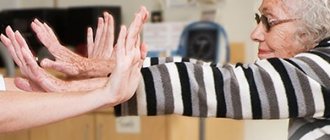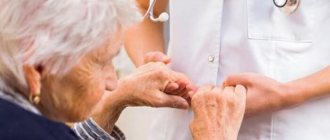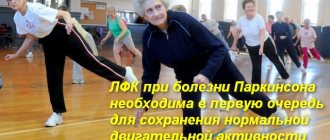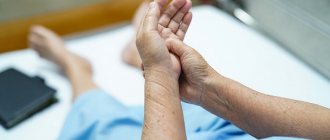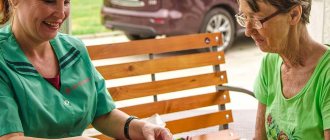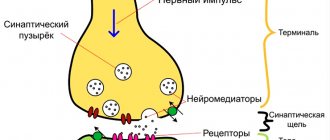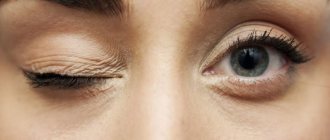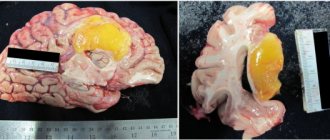Parkinson's disease: treating the incurable?
The disease indicated in the title refers to degenerative neurological diseases in which neurons are destroyed and the synthesis of dopamine, one of the most important neurotransmitters, is reduced.
The disease develops slowly but inevitably. It all starts with almost imperceptible symptoms - loss of smell, sweating, decreased mood, difficulty defecating. Most patients do not pay attention to this until one of the most characteristic signs of Parkinson's disease appears - slowness and stiffness of movements. As the disease progresses, stiffness of movement increases, and muscle tension develops (hypertonicity, muscles become rigid). One-sided small-amplitude trembling of the fingers and hands may occur, subsequently spreading to the other side of the body. At later stages, a person loses the ability to maintain balance and move independently, thinking slows down, and deep apathy and depression develop. There are no drugs that can completely stop the disease. Modern therapy is aimed at alleviating the patient’s condition and slowing down the progression of the disease.
Parkinson's disease
Parkinson's disease is an idiopathic progressive chronic disease that affects the human nervous system. There is a general term "parkinsonism" that includes a number of diseases that are characterized by certain symptoms, all of which are present in Parkinson's disease itself. It is necessary to distinguish between these two concepts, since parkinsonism diseases have the same manifestations, but differ in etiology. Diagnosing Parkinson's disease is possible only through clinical observations of the patient due to the lack of accurate laboratory tests for its detection.
According to general medical statistics, in 75-80% of cases of parkinsonism, Parkinson's disease is diagnosed. Figures regarding the incidence of diseases in the world vary significantly - from 4 to 20 cases per 100,000 (per year). Thus, there are about 140 patients per 100,000 population as a whole. The average age of onset of the first symptoms of the disease is quite early - 55 years. The ratio of women to men among patients is observed as 2:3. About 20% of all cases begin with tremors and awkwardness in only one arm or leg.
In Parkinson's disease, the neurons responsible for the production of the vital neurotransmitter, dopamine, . A characteristic feature of this disease is the presence of Lewy bodies in the substantia nigra. External signs can be extremely subtle, which significantly complicates early diagnosis.
The primary neurological manifestations of the disease are often asymmetrical, manifested through difficulty moving and tremor in one leg or arm, sometimes combined with a general feeling of awkwardness when walking. A decrease in tremor amplitude can be observed after sleep and increase during times of stress. As the disease progresses, posture becomes distorted, stooping appears, and the gait becomes shuffling, consisting of short, difficult steps.
Already the first symptoms are accompanied by muscle cramps, pain in the back and limbs. Patients often complain of a feeling of pressure and stiffness in the calf muscles or shoulder girdle. What helps to suspect Parkinson's disease in such cases is that difficult, painful movements and tremors are combined with other nonspecific symptoms - insomnia, a feeling of constant fatigue, urogenital disorders, constipation, seborrheic dermatitis and depression.
The significantly advanced stage of Parkinson's disease has a number of noticeable manifestations - bradykinesia, hypometria, hypomimia, microphagia, brachybasia, hypophonia, acheirokinesis, rare blinking, rigidity and postural instability. Tremor begins to accompany patients not only in movement, but also at rest, showing a considerable amplitude of 3-6 Hz.
Today, Parkinson's disease not only remains an incurable disease, but it is virtually impossible to even slow down its progression. All actions of doctors, including surgical interventions, are aimed at improving the quality of life of patients at least for some time. Modern medicine uses symptomatic and neuroprotective therapy.
Symptomatic treatment focuses on the specific manifestations of Parkinson's disease, with the goal of relieving pain and allowing the patient to regain some control over their body only temporarily. Neuroprotective therapy is considered more popular and relevant, which can slightly stop the transition of the disease to the next stages, slowing down and replenishing the loss of dopaminergic neurons. However, in evidence-based medicine today there are no neuroprotectors with 100% proven effectiveness.
Exercise therapy, massage, physiotherapy for Parkinson's
Disability in Parkinson's disease
Features of caring for patients with Parkinson's disease
Speech disorders in Parkinson's disease
Medicines
The selection of medications for the treatment of Parkinson's disease depends on the stage of the disease. At the very beginning of the development of the disease, doctors use drugs that stimulate the synthesis of dopamine, a neurotransmitter, the amount of which decreases in parkinsonism. Drugs are also used that stop the breakdown of this neurotransmitter, prevent its reuptake, and stimulate the corresponding receptors in the brain. These drugs are in many ways similar to antidepressants.
In the early stages of the disease, dopamine receptor agonists are used based on the following active ingredients:
- pramipexole;
- ropinirole;
- piribedil;
- rotigotine;
- MAO inhibitors type B (active ingredient rasagiline;
- activator of dopamine release from neuronal depot - amantadine.
At the third of five stages of disease development, a drug with the active substance levodopa is prescribed. If the disease debuted after the age of 70 years, then, as a rule, a levodopa-based drug is prescribed immediately.
Features of treatment
It is impossible to completely cure the disease, but it is quite achievable to slow down the progression of pathological processes, improve the patient’s quality of life and its duration. Traditional medicine offers many recipes for decoctions and infusions that can be effective in the fight against this insidious disease. But they should be used only in combination with the main therapy, consisting of medications. Otherwise, a sharp progression of pathological processes is possible, which will significantly shorten the patient’s life expectancy.
Before starting treatment for Parkinson's disease with folk remedies, you should consult your doctor. He will individually select the optimal therapy, taking into account contraindications, compatibility of herbs with medications, and the possibility of side effects.
Traditional recipes can provide maximum effectiveness in the first to third stages of the disease in combination with therapeutic exercises, massage and proper nutrition.
A massage with jasmine or bay oil will relieve muscle tension. Physical exercise will strengthen muscles, restore coordination of movements and help resist illness. Dancing, yoga, swimming, walking in the fresh air are recommended. Walking on sunny days is especially beneficial, as it promotes the synthesis of vitamin D, without which the normal functioning of the nervous system is impossible.
Mental activity - solving crosswords, scanwords, rebuses, puzzles, playing chess - will improve brain function and slow down the destruction of neurons. A positive attitude is important for successful treatment. Watching humorous programs, hobbies, auto-training, meditation, and prayers to Panteleimon the Healer can improve your mood and fill you with optimism.
Are there non-drug treatments for Parkinson's disease?
Modern comprehensive treatment of Parkinson's disease also includes non-drug therapy.
Neurosurgical approach - deep brain stimulation
This radical approach to the treatment of Parkinson's disease involves the stereotactic insertion of electrodes into strictly defined structures of the brain. When electrical impulses are applied with a certain frequency and intensity, motor disturbances in Parkinson's disease, especially tremor, are significantly reduced. Basically, the neurosurgical approach is indicated for patients who are resistant to drug therapy. During this relatively minimally invasive (for neurosurgery) operation, some subcortical structures of the brain are destroyed. This is one of the most effective surgical treatments for Parkinson's disease.
Treatment of Parkinson's disease with folk remedies
Treatment of Parkinson's disease with folk remedies is a very relevant topic for patients and their relatives. This treatment is effective in the initial stages of the disease, when the percentage of death of neurons that synthesize dopamine, which is involved in the transmission of impulses for the coordination of movements, is still insignificant. Therefore, Parkinson's disease symptoms and signs are not very severe.
The reasons for the death of neurons in the substantia nigra of the brain that produce dopamine have not yet been established. Treatment with folk remedies should be aimed at reducing the destruction of nerve cells by improving their nutrition, breathing, etc.
Treatment of Parkinson's disease with folk remedies should be considered as additional to the main complex therapy prescribed by a neurologist.
Natural remedies to calm the nervous system
Stress increases the death of nerve cells, including dopamine-forming ones: fear of an incurable disease, despair, anger, irritation, etc. All these negative emotions cause spasm of the blood vessels of the brain, even rupture of the smallest capillaries. As a result, the blood supply to the brain and nerve cells, that is, their nutrition, is disrupted, which increases the death of neurons.
In general, in a healthy person, nerve cells normally die every day, but in Parkinson’s disease this death becomes widespread and steadily, but slowly progresses.
Despite the fact that modern traditional medicine cannot cure this disease, its manifestations can be delayed and slowed down for years. Most patients live with this disease for about 15-20 years.
Of course, the quality of life decreases due to increasing movement disorders in the form of trembling, muscle rigidity, changes in gait, posture, slower movements, etc. But the disease is not fatal! Read Parkinson's disease: how long do you live with it?
Therefore, the task of a patient diagnosed with Parkinson's disease is to understand that his negative attitude (stress) has a detrimental effect on the nervous system and its neurons.
It is difficult to cope with stress, so natural remedies that calm the nervous system are recommended in the form of tea, decoctions and herbal infusions: valerian, oregano, motherwort, mint, lemon balm, thyme, white broom, yarrow, etc.
Taking, for example, tea from the collection of the above listed herbs, should be constant. You just need to change the composition of the herbs in the collection.
Herbalists recommend calming infusions:
- Take the herbs valerian, oregano, white broom and yarrow in equal quantities. For 1 liter of boiling water – 1 teaspoon of each herb. Leave in a thermos for one hour, strain and drink 100 g before meals twice a day for a week.
- In the second week, the herbs for tea can be changed. Make tea in the same way from a collection of motherwort, mint, thyme and lemon balm herbs.
If any herb is not suitable, it can be replaced. Be sure to consult with your doctor.
Treatment of Parkinson's disease with folk remedies involves the use of sage leaves. Sage relieves nervous tension, helps cope with depression and fear, improves memory, reduces stiffness of movement and trembling.
Sage leaves contain essential oil rich in flavonoids, vitamin P, organic acids and tannins.
There are many recipes for using sage. For Parkinson's disease, for example, it is recommended to take 1 tbsp of sage decoction orally. spoon 3 times a day after meals, washed down with milk. Prepare at the rate of 1 tbsp. spoon of dry leaves per 1 cup of boiling water, leave for an hour.
Can be combined with taking an oral bath with sage, 5-6 baths every other day to relieve muscle spasms and reduce tremors. 300 grams of leaves are brewed in a large saucepan with boiling water. Leave for 12 hours. Then pour it into the bath, the water temperature is not higher than 38 degrees. You need to immerse yourself completely in the bath, lowering the back of your head. The duration of the procedure is 15-20 minutes.
Constant walks in the forest, park, or by the river in any weather will help maintain a positive mood and nourish the brain with oxygen.
It is necessary to be outdoors on sunny days, since a lack of vitamin D leads to rapid destruction of the myelin sheaths of nerve cells.
Not only do you need walks, but also, to the extent of your strength and condition, you need to engage in physical exercise, running, walking, yoga, dancing, etc. Read more at the link Parkinson's disease and life expectancy.
In later periods of the disease, the attending physician prescribes physical training complexes under the supervision of a methodologist.
Proper nutrition and neuronal regeneration
Treatment of Parkinson's disease with folk remedies includes proper nutrition, what is possible and what is not is associated with the supply of nutrients that promote the restoration of nerve cells in the brain.
Scientists at the University of Barcelona have proven the regenerative ability of neurons in the hippocampus and olfactory bulb of the brain. In their opinion, to restore nerve cells it is necessary to consume foods rich in polyphenols and polyunsaturated fatty acids, especially linoleic acid.
This is also confirmed by practice: it has been observed that eating foods rich in linoleic acid (sunflower oil, walnuts, rabbit and goose meat, eggs, buckwheat) reduces tremors in patients.
If you have Parkinson's disease, it is better to follow a carbohydrate diet with a predominance of vegetables and fruits rich in antioxidants - vitamins C, E, as well as vitamins D and group B. For example, thiamine (vitamin B₁) helps increase dopamine in the brain.
With normal stomach acidity, it is recommended to take 50-70 grams of fresh cherry and spinach juices several times a day, alternating juices.
It is important to drink enough pure or mineral (still) water.
A restorative diet with sufficient content of polyphenols and polyunsaturated fatty acids improves metabolism in the brain and helps slow down the death of neurons.
Natural remedies that cleanse blood vessels and relieve tremors
To cleanse blood vessels and improve blood circulation, it is recommended to consume garlic, lemons, sprouted wheat grains, and oats.
Oats not only cleanse blood vessels, reduce cholesterol levels in the blood, but also strengthen the musculoskeletal system.
The recipe for making oat decoction is simple: pour 1 glass of unhulled oats with 3 liters of boiling water and simmer over low heat for one hour. Then pour into a thermos overnight. During the day, strain and drink unlimitedly instead of tea, water, adding honey.
Every day you need to brew a new portion of oats. The duration of treatment is a month, then a break of about a month, and repeat the course again.
In the early stages of this disease, treatment with bee products: propolis, honey, royal jelly can be helpful.
However, traditional medicine recipes should be used after consultation with your doctor.
Since the causes of Parkinson's disease are not known to traditional medicine, there are different opinions about the causes of the disease, both among scientists and doctors, and among the people. For example, there is an assumption that the disease is caused by parasites of the human body.
Moreover, there is evidence that after cleansing the body, patients’ symptoms of the disease weakened.
Traditional medicine suggests cleansing the patient’s body with poisonous herbs: wormwood, hemlock, belladonna, etc.
However, self-medication with poisonous plants is dangerous, so we do not provide recipes for preparing medicines from them. You should always consult your doctor.
You can relieve the symptoms of trembling limbs and stiffness of movement by massaging your hands and feet with bay and jasmine oils. Baths with thyme soften muscles and ease their spasms.
It must be remembered that treatment of Parkinson's disease with folk remedies can only be an aid in the main therapy. Therefore, visit your doctor in a disciplined manner, accept his advice and prescriptions. Consider and create your treatment plan based on your doctor’s prescriptions, with the addition of non-traditional herbal treatments, acupuncture, spiritual practices, etc.
Be persistent and patient in treatment!
Our brain, like man as a whole, is a great miracle of nature, which obeys biological laws and the spiritual guidance of God - the Supreme Creator.
Treat your illness as a challenge and a life lesson. Consider what this lesson teaches you.
Don't despair, hope for the best! Miraculous healing happens if you believe and bring it closer.
Rehabilitation
Aimed at restoring normal muscle tone. Balneotherapy, electrical stimulation, reflexology, and electrophoresis are usually prescribed. At any stage of Parkinson's disease, physical therapy is necessary to help maintain good coordination and flexibility: stretching exercises, maintaining balance, cardio training. Movement therapy helps patients adapt to the changes occurring in the body and develop the correct movement algorithms, since as the disease progresses, the old ones cease to be effective.
Rehabilitation measures are aimed at reducing anxiety levels, improving mood and combating symptoms of depression. All these signs are very characteristic of this disease.
Rules for taking medicinal baths
Treatment of Parkinson's with folk remedies will be ineffective if certain rules are not followed. They also exist for baths:
- Using traditional methods of treatment, Parkinson's disease cannot be completely cured. The use of baths must be coordinated with the attending physician. The course of procedures begins only after its approval and in a strictly designated order.
- You should take a bath no earlier than 2 hours after eating.
- The body should only be submerged up to the top of the chest and not up to the neck.
- The course consists of 5-10 procedures, depending on the specific type.
- The duration of the bath should not exceed 20 minutes.
- Procedures should be carried out every other day, not daily.
- The temperature should not exceed 37 degrees.
It is recommended to spend the next hour after taking a bath calmly. It is best to lie down in silence or drink a cup of herbal tea, which enhances the effect of the procedure. Traditional medicine for Parkinson's should be used with caution. If side effects occur during a visit to the bath or immediately after it, the course must be canceled and the current situation discussed with your doctor.
It is impossible to cure Parkinson's with folk remedies. Traditional medicines do not provide complete relief from this disease. But a competent combination of several methods can seriously improve the patient’s condition, reduce the manifestation of symptoms, and improve the quality of life. The use of one or another treatment method should always be agreed with a doctor, since it is necessary to take into account not only the characteristics of the underlying disease, but also associated problems and chronic disorders.
Psychotherapy
There is no doubt that Parkinson's disease significantly changes a person's life. It is very difficult to cope and come to terms with these changes. Often patients need the help of a psychotherapist. Only working with a good specialist will help overcome depression. Maintaining good spirits is one of the primary tasks facing a patient with such a diagnosis. Doctors have long noticed that the success of treatment largely depends on the patient’s mood.
General recommendations
People with Parkinson's disease will have to reconsider their entire lifestyle. For example, you need to pay special attention to your diet. Digestion in this disease suffers significantly, patients often complain of constipation. To avoid this, you need to include in your diet as many fiber-rich foods as possible - vegetables and fruits, brown rice, bran bread, beans. We must not forget about proteins - best in the form of lean meat and fish, as well as eggs. Vitamins are required for normal metabolism, especially vitamins C and E. It is necessary to drink as much water as possible, since dehydration is common in Parkinson's disease.
The regimen for taking prescribed medications is also important. They must be taken exactly on the clock according to the doctor's recommendation.
Baths with folk remedies for the treatment of Parkinson's
Therapeutic baths are not just folk remedies for Parkinson's, but real physiotherapeutic remedies. They effectively combat the unpleasant manifestations of the disease, improving not only the physical, but also the mental state. Some of them cannot be prepared at home, but most are quite accessible.
Important. A therapeutic bath is selected for the most pronounced symptoms of the disease. Their different types do not mix with each other and do not alternate during one course.
Therapeutic baths for Parkinson's disease
| Bath type | Effect on the body | How to cook |
| Conifers | Have a general strengthening effect | 1 kg of pine needles is poured with 10 liters of cold water and infused for 12 hours. After this, the infusion is brought to a boil and filtered. The resulting solution is poured into a warm bath. |
| With baking soda | Have a calming effect | A pack of baking soda is dissolved in a bath of warm water. |
| With sage, valerian, motherwort, wormwood, you can add other herbs that have a positive effect on the nervous system. | Normalize muscle tone and improve mental state. | 500 g of herbal mixture is poured into 10 liters of cold water and infused for 12 hours. After this, the mixture is brought to a boil and filtered. The resulting solution is poured into a warm bath. |
| With hay infusion | Relieves tension and helps fight insomnia. | 500 g of hay is poured into three liters of boiling water and infused for 15 minutes. After this, the solution is filtered and poured into a warm bath. |
New in the treatment of Parkinson's disease
European research is being conducted in the areas of soft pulsed electrical stimulation of neurons and gene therapy. But as long as the causes of Parkinson's disease remain unclear, no cure will be found to completely cure it. Currently available treatment helps improve quality of life and delay the progression of the disease, so that patients who have recently been diagnosed with this disease have every chance of maintaining the ability to self-care for many years.
Parkinson's disease is one of the most serious illnesses for older people. In order to alleviate its manifestations and improve the general well-being of the patient, professional care and a solid material and technical base are required. Modern geriatric centers can provide all this.
Nutrition for Parkinson's disease
Nutrition plays an important role in Parkinson's disease. One of the manifestations of the disease, as well as a common side effect of many medications, is constipation. That is why food must have the required amount of fiber. You can also take laxative teas, prunes and other products with a laxative effect.
Taking levodopa medications should not be combined with eating protein foods. Citrus fruits are also not recommended, especially orange and grapefruit juice. Stimulation of liver enzymes when taking these products leads to increased destruction of the active substance.
Nutrition must be sufficient; in the presence of concomitant diseases (atherosclerosis, diabetes), it is necessary to take into account the nutritional characteristics of these pathologies.
Where to go for treatment for patients with Parkinson's disease?
Maria Litvinova, Deputy General Director for Medical Affairs of Senior Group, says:
“We accept elderly people with Parkinson’s disease into our care and rehabilitation centers for short and long stays. The minimum is two weeks, as adaptation to new conditions will be required. A long stay can be partially paid for by the state, since our company is officially a provider of social services in Moscow and the Moscow region. Therapeutic physical education, classes on modern simulators, comfortable rooms with special orthopedic furniture, individual diet, drug therapy - all this helps a person with Parkinson's disease feel better and overcome a depressive state. We strive to maintain a relaxed, club-like atmosphere in which our guests can freely socialize with each other and their families. At the same time, round-the-clock monitoring of their condition is ensured and security measures are taken: territory navigation, video surveillance, professional security. All this meets the high requirements of Israeli geriatric protocols, according to which we work. An interdisciplinary team of doctors: a rehabilitation specialist, a geriatrician, a psychiatrist, a neuropsychologist, and exercise therapy instructors conducts daily classes with patients with Parkinson’s disease.”

